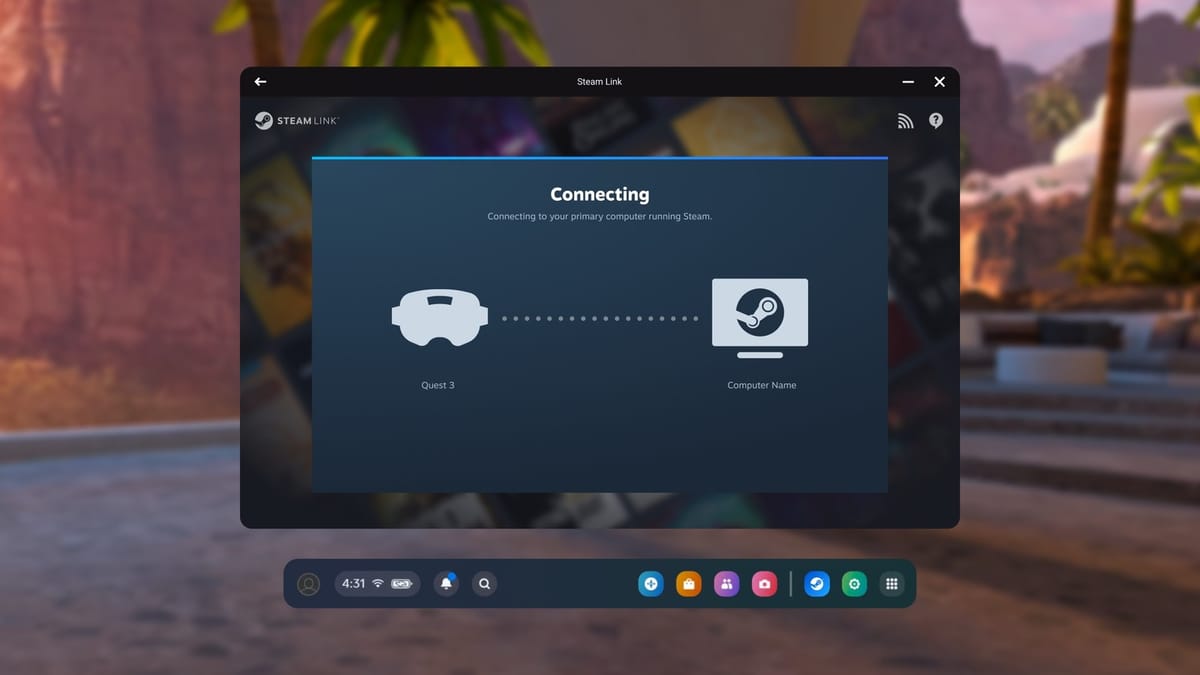Valve launching an app on Meta's platform, and Meta's CTO praising it, highlights just how much the VR industry has changed in recent years.
The Steam Link Quest app launched on the official Quest Store yesterday, approved by Meta. It lets you wirelessly play SteamVR games like Half-Life: Alyx and Boneworks or your traditional non-VR Steam games on a giant virtual screen.

In a post on X, Meta CTO Andrew Bosworth described Valve's app as the "easiest way by far to stream your PC games to Quest headsets".
This is so exciting! Easiest way by far to stream your PC games to Quest headsets. https://t.co/tazc6YmBrX
— Boz (@boztank) November 30, 2023
In the minds of many PC VR enthusiasts Meta and Valve are still considered fierce competitors in VR. Steam Link for Quest and Bosworth's statement on it, however, may require them to update their mental model.
Steam vs The Oculus Rift Store
Valve worked closely with Oculus in the early stages of research and development of the Rift throughout 2013, after Gabe Newell officially endorsed Palmer Luckey's Kickstarter campaign in 2012.
Less than a decade later, though, the Rift headset line was officially replaced by the Link mode of Quest headsets. What happened in the years between is still somewhat cloaked in a veil of professional silence, though books like Blake Harris' History Of The Future have peeked behind the curtain. For those just catching up, though, here's what people saw happen over that decade:
In early 2014, Facebook acquired the Oculus startup and hired many of Valve's top engineers working on VR. Perceiving this as a long-term risk to Steam, Valve then worked with HTC to build a Rift competitor with direct Steam integration, the Vive. Together, they beat Oculus to market with tracked controllers. But while Vive started out as the market leader, Rift significantly outsold it over time, driven by Facebook's deep price cuts, exclusive games, and preferred controllers.
In 2019 Valve launched the Index at $1000 for the full kit. When the standalone Oculus Quest started taking off that same year, as the Lenovo-made Rift S sold to PC buyers, Facebook started to retreat from PC VR. In 2021, the last major Rift Store exclusive shipped and the Rift S headset was discontinued.

These transitional years saw unofficial SteamVR streaming apps like Virtual Desktop, and then the official Oculus Link, turn Quest headsets into the most common way to play SteamVR content. 42% of the headsets used for SteamVR in October were Quests, and that figure has been higher than 50% in many months.
Meta's VR efforts are no longer any kind of threat to Steam. In fact, Meta's headsets have become a huge asset for VR on Steam. Launching Steam Link on the Quest store just streamlines the experience and cuts out the need for intermediary software.
A Changed Competitive Landscape
Meta no longer directly competes on the PC platform. The Oculus PC app has received only minor maintenance updates for years now, and Link doesn't even support 120Hz on Quest 3.
What also makes Bosworth's statement historically interesting is that Facebook once blocked Wi-Fi PC VR streaming from being allowed on the Quest Store. Virtual Desktop's developer Guy Godin was forced to remove the feature from the Quest Store build for almost two years, until just months before Meta launched its own Air Link feature.
Bosworth's comment doesn't actually say "VR", but the fact that he would praise Steam Link rather than Meta's own Air Link, and the fact that Valve launched it on Quest at all, is a clear sign that this industry has changed significantly since the early years of consumer VR, and even since the first years of Quest. As Apple enters the ring, could we be in for even more cooperation between companies once thought bitter enemies?































